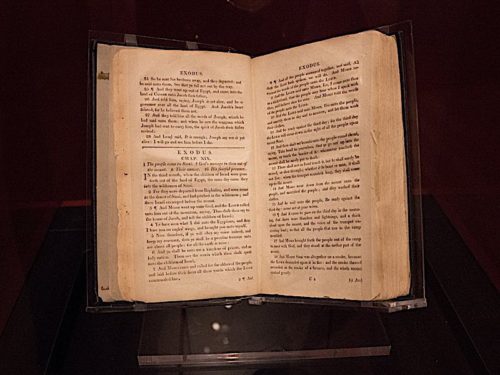The “Slave Bible” Removed Key Biblical Passages In Order to Legitimize Slavery & Discourage a Slave Rebellion (1807)
Share
Explore Our Galleries
Breaking News!
Today's news and culture by Black and other reporters in the Black and mainstream media.
Ways to Support ABHM?
By Josh Jones, Open Culture.com

Photo via the Museum of the Bible
In an 1846 speech to the British and Foreign Anti-Slavery Society, Frederick Douglass summed up the twisted bond between slavery and religion in the U.S. He began with a short summary of atrocities that were legal, even encouraged, against enslaved people in Virginia and Maryland, including hanging, beheading, drawing and quartering, rape, “and this is not the worst.” He then made his case:
No, a darker feature is yet to be presented than the mere existence of these facts. I have to inform you that the religion of the Southern states, at this time, is the great supporter, the great sanctioner of the bloody atrocities to which I have referred. While America is printing tracts and Bibles; sending missionaries abroad to convert the heathen; expending her money in various ways for the promotion of the gospel in foreign lands, the slave not only lies forgotten, uncared for, but is trampled underfoot by the very churches of the land.
Douglass did not intend his statement to be taken as an indictment of Christianity, but rather the hypocrisy of American religion, both that “of the Southern states” and of “the Northern religion that sympathizes with it.” He speaks, he says, to reject “the slaveholding, the woman-whipping, the mind-darkening, the soul-destroying religion” of the country, while professing a religion that “makes its followers do unto others as they themselves would be done by.”
Douglass harshly condemns slave society in the U.S., but, perhaps given his audience, he also politically elides the extensive role many churches in the British Empire played in the slave trade and Atlantic slave economy—a continued role, to Douglass’s dismay, as he found during his UK travels in the 1840s. I’m not sure if he knew that forty years earlier, British missionaries traveled to slave plantations in the Caribbean armed with heavily-edited Bibles in which “any passage that might incite rebellion was removed,” as Brigit Katz writes at Smithsonian. But he would hardly have been surprised.
The use of religion to terrorize and control rather than liberate was something Douglass understood well, having for decades keenly observed slave owners finding what they needed in the text and ignoring or suppressing the rest…
Read full article here
More about Slave Bible here
More Breaking News here
View more galleries from the ABHM here











Comments Are Welcome
Note: We moderate submissions in order to create a space for meaningful dialogue, a space where museum visitors – adults and youth –– can exchange informed, thoughtful, and relevant comments that add value to our exhibits.
Racial slurs, personal attacks, obscenity, profanity, and SHOUTING do not meet the above standard. Such comments are posted in the exhibit Hateful Speech. Commercial promotions, impersonations, and incoherent comments likewise fail to meet our goals, so will not be posted. Submissions longer than 120 words will be shortened.
See our full Comments Policy here.